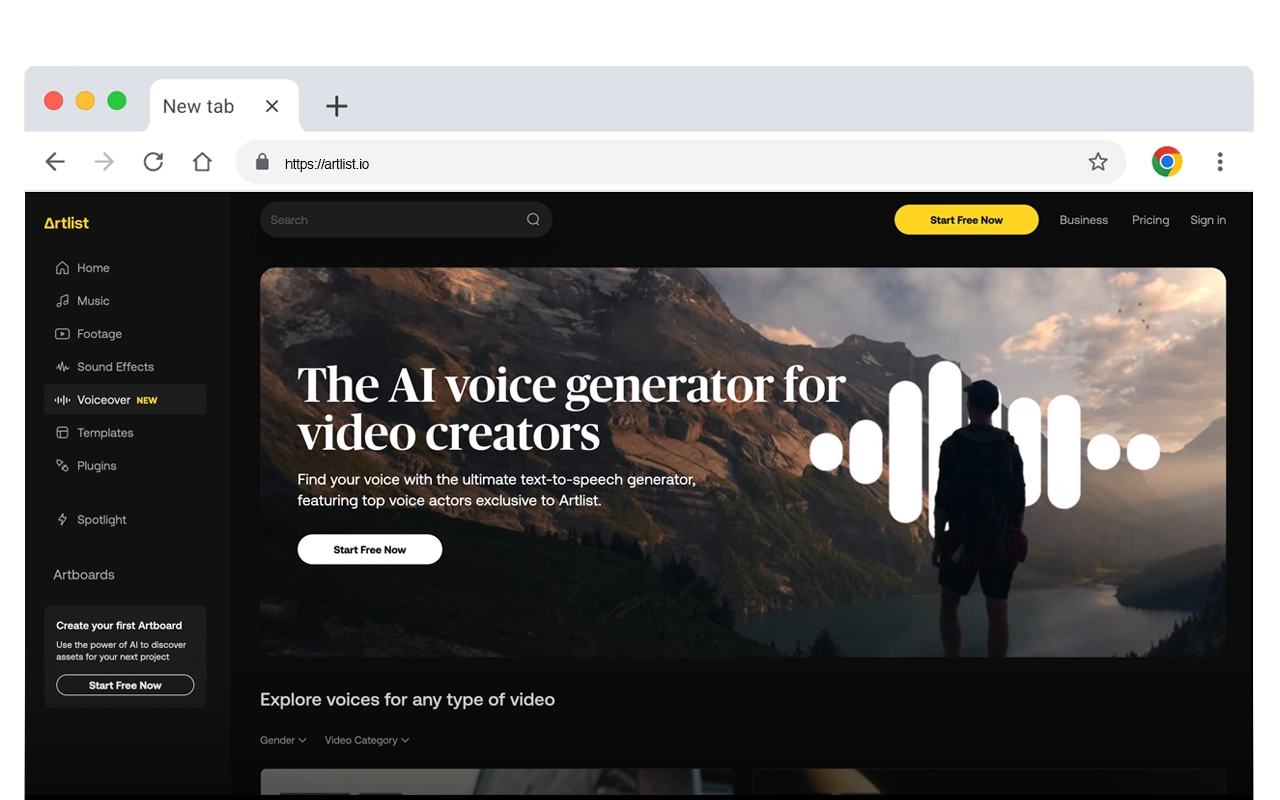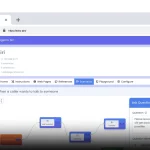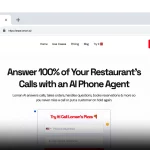Writing to Sell: Crafting Commercial Scripts that Convert

Generate AI Voices, Indistinguishable from Humans
Get started for freeTable of Contents
Commercial scripts include advertisements and television shows. As a writer, choosing a niche is the first step towards building scripts that convert. Monetizing your craft will allow you to build a reputation for yourself in the industry and will open new doors for you. In the time of artificial intelligence overtaking content creation, realizing that your space in the commercial industry as a writer stays unique, is essential.
A writer can craft a script that appeals to the masses based on their personal experiences and observations. It is the job of a writer to bank on their human experience and emotional range to create commercial scripts that convert. In this comprehensive guide for writers, we will be sharing tips and tricks for all creators who are writing to sell on a commercial level.
Things To Keep In Mind Before Writing To Sell
When you are writing a commercial script, you have to consider the larger demographic in order to make it more relatable. There is strength in numbers on a commercial scale, and a writer should know how to harness that with a convincing script. Here is what you should keep in mind when you aim to sell your commercial scripts:
Aim Towards A Solution
A commercial script will convert if it adds value to existing knowledge. As a writer, it is essential to look at the script as a means to solve an issue. The focus should be on creating a solution rather than detailing the problem. The aim of commercial writing is to reach the masses on behalf of a corporate body and build a connection.
The easiest way of achieving that is by depicting an awareness of a general problem and then providing an effective and accessible solution. The aim should be to address concerns with answers, not merely empathy.
Use Facts And Target Words
A commercial script is likely more believable if you back up your claims with statistics and facts. While writing advertisement scripts, it is vital to provide adequate information to the viewer that makes them feel educated enough to make the right call. When you provide the solution to a problem, presenting facts relating to your method will build the case in your favor. Statistics and citing sources are great ways to build credibility while outlining the benefits of your method.
Grabbing the attention of the audience remains the concern, but so is retaining the attention with the right content. One way to attract and retain the right audience is by using target keywords subtly yet effectively in the script. A commercial script is more likely to be converted if the target words are naturally incorporated and support the overall message of the text.
Use Emotions To Your Advantage
Human beings are primarily driven by emotions. While being emotional is associated with being sad to the point of tears, evoking emotions holds a different meaning. Writers in the commercial space are banking on provoking emotions that drive the audience in a particular direction.
The primary emotions that the commercial space utilizes are fear, excitement, and envy. For instance, if you are writing for an advertisement promoting a limited-period offer, fear and excitement are the primary emotions to go for. The fear is of missing out on a limited-period deal, and the excitement is to take advantage of new offers. A commercial writer knows how to convert a want into a need.
Things To Keep In Mind While Writing To Sell
Create A Narrative
As a writer, you have the liberty to use your imagination as a means to an end. Writing a commercial script is not purely factual mechanical. It considers emotional triggers and human problems. To incorporate the same, it is necessary to create a narrative. A straightforward narrative will have a beginning, a conflict, a resolution, and a denouement.
- A beginning: The beginning is where you create a world with unique characters with distinguished motivations. You make them a part of a world and establish the environment for the plot to progress. For instance, a playground with two children, one of whom is clumsy and the other who is careful.
- A conflict: The conflict arises from the already presented environment and will allow the characters to develop. For instance, the clumsy child falls and gets their clothes dirty while the careful one still has clean clothes on.
- The Resolution: Since a commercial script provides a solution after mentioning the problem, this is where the first two parts of the narrative lead. For instance, rather than focusing on the problem of dirty clothes, the solution is to wash them with an effective powder.
- Denouement: Rather than ending the script on the resolution, a proper narrative waits to show the impact of the resolution. To complete the story and to also appeal to the audience to achieve the same level of satisfaction as shown. For instance, consider an advert with a dissatisfied singer who goes to find a new mic. The end should not be the purchase but the satisfying use of the mic in the recording studio.
Be Clear On Benefits
A way to implement the fear of missing out is by outlining the potential benefits the audience might lose if they do not act right away. An effective commercial script will personalize the experience for the audience rather than mechanically mentioning features. The idea behind writing compelling scripts is to focus on ‘you’ rather than ‘us’ or ‘we.’ It is evident to the audience that your brand is providing the service.
What is important is how they aim to achieve the same. Rather than announcing that the brand can do five things, aim to write how the user can get five benefits. Additionally, it is essential for the script to be as unambiguous as possible. The intention of the script should be clear. For instance, advertising a sale can provide more information with ‘Up to X% discount’ rather than only mentioning ‘Big Saving Time.’
Mind Your Tone
The tone of your words is directly related to the type of situation you set for your script. For instance, if your advert aims to target an urban audience, the tone should match the same. Using the colloquial language of a specific area will be better if the script is geographically limited. Similarly, the style of writing is also directly dependent on the audience for whom you are building the script.
For instance, writing for an audience of older adults would adopt a different style than when you write for a teenage audience. Combining the demographic audience with their geographical location will provide you with the right tone to follow. A commercial script will more likely convert if the content turns out to be relatable.
Consider Both Video And Audio
A writer creates the foundation on which the ideas will be built. While writing a commercial script, it is vital for the writer to consider how the words will be incorporated audio-visually. For instance, a writer creating a script for a television ad will have to consider the visual element as well as the audio element as opposed to a writer for a radio or printed ad. A script can include:
- Audio elements: Audio elements like sounds, noises, off-screen dialogues, and background music are to be taken into consideration while writing. The writer can include these in the script to create a better atmosphere.
- Visual elements: Video elements set the scene and are akin to a screenplay. You can set the scene in any environment and incorporate new elements as the script progresses. Video elements can aid the message as a TV viewer will imbibe the message as a whole.
An important point to be noted while incorporating audio and visual cues or themes is to not overdo it. It is important to realize that an overly detailed description from the writer hinders the creativity of the director. It is better to provide cues and not guidelines to achieve the best results.
Things to Keep In Mind After You Finish Writing
Finalise And Edit
After you have completed your script, it is better to reread and edit. The first draft should be revised based on feedback that you get from trusted sources. Getting feedback and subsequent revisions will help in identifying the impact of the message. It is also important to revise based on external input as they can help with pacing, tone, and relatability of the content.
You can join focus groups so that your ability to create commercial scripts as a professional writer becomes more refined. You can also go directly to a table read and gauge the reaction of the readers to revise your draft. Editing is a necessary part of writing. Commercial scripts need to be crisp and concise in order to convert. Revisions and changes will help in effectively reaching the demographic in the right style.
The Takeaway
Crafting commercial scripts is the art of selling a message with the right words. You can create scripts for any purpose with the right approach. A writer strikes the perfect balance of emotions and technicality to appeal to a larger audience. Commercial scripts that convert use the right tone, set the right scene, and create the right situation.
Whether it is using target keywords or subtly making the audience act, the right script can convey the message effectively, even if the runtime is 20 seconds. Written words, spoken words, and visuals interact in television commercials. It is best to consider clarity in the message, irrespective of the medium. It will help send the message across with no vagueness.
FAQs (Frequently Asked Questions)
What Is A Unique Selling Point (USP)? Is It Important In Writing Commercial Scripts?
A USP or a unique selling point is a feature of the product that shows its uniqueness from other products in the same category. A USP makes a product unique in comparison to its competition. It is crucial in writing commercial scripts so that one can create a compelling narrative outlining the best features of the product. A commercial script can naturally incorporate a unique selling point to promote it to the right audience.
Is Call To Action Or CTA Important For All Commercial Scripts?
A call to action or CTA is essential while writing commercial scripts because it urges the audience to act rather than passively read, listen, or watch. Since the commercial script is all about providing solutions, the narrative should drive the audience to rush toward it. A CTA promotes a sense of urgency. Whether it is a sale or a new launch, a call to action allows the audience to participate in order to avail themselves of the opportunity before they miss out.
Are All Commercial Scripts For The Same Time Duration?
No, the time duration for commercial scripts varies. Depending on the message and purpose, it can range from 15-20 seconds to a few minutes. Considering the time duration while writing a commercial script allows the writer to be concise and precise about the message they convey. It also hones in the message without any ambiguity. The smaller the duration, the more tightly packed your script should be to convert.
What Do You Need To Know Before Writing To Sell?
Before writing to sell, it is helpful to research the commercial script format. In addition, you should also know how to prepare before writing, do’s and don’ts while writing, and the revision process after writing. Consider practicing with prompts to refine your skills. You can also join focus groups to get more exposure to commercial scriptwriting.
Can You Add Voice Overs And Music To The Script?
You can add audio elements to the script while writing. Voice overs are used when there is narration from a character off-screen. You can add voice overs or music to the entire duration of the script or at certain moments as per requirement. It is pertinent to note that the audio elements should work towards enforcing your message and should work in tandem with your narrative.
Text To Speech Leaderboard
| Company Name | Votes | Win Percentage |
|---|---|---|
| PlayHT | 539 (678) | 79.50% |
| ElevenLabs | 98 (191) | 51.31% |
| Speechgen | 24 (177) | 13.56% |
| TTSMaker | 65 (174) | 37.36% |
| Listnr AI | 58 (168) | 34.52% |
| Uberduck | 86 (166) | 51.81% |
| Resemble AI | 74 (156) | 47.44% |
| Narakeet | 65 (155) | 41.94% |
| Speechify | 68 (153) | 44.44% |
| Typecast | 43 (140) | 30.71% |
| NaturalReader | 15 (49) | 30.61% |
| Murf AI | 10 (42) | 23.81% |
| WellSaid Labs | 10 (40) | 25.00% |
| Wavel AI | 9 (39) | 23.08% |
Similar articles

Best Neuphonic Alternatives

Best AI Voice Designers: Create Custom Voices with AI

AI Voice Design. Custom AI Voices for Perfect Voice Experiences.

Best Artlist.IO Alternatives

AI Voicemail Generators: From Personal Greetings to Business Solutions

How to Voice Over a Video: A Beginner’s Guide

Best Cartesia AI Alternatives

Vlog Narration: The Ultimate Guide for Beginners

AI Audiobook Narration: The Future of Listening Unveiled

AI Narrator Voice: Unlocking the Power of AI for Natural-Sounding Voiceovers

Radio Marketing: The Underrated Advertising Medium That Still Packs a Punch

Documentary Voice Over: Crafting Narration for Captivating Storytelling

Custom Voicemail Greeting: How to Create a Professional First Impression for Your Callers

Kits AI Voice Designer: Everything You Need to Know

Radio Commercial Maker: The Art and Evolution of Radio Advertising
































































































